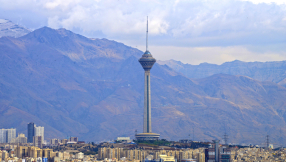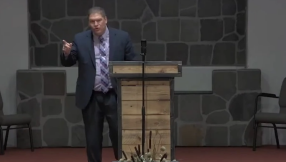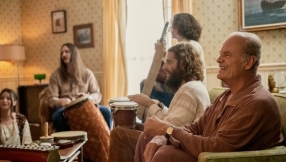
What does 'loving our enemies' look like in our bitterly divided society? Although they don't always make the headlines, many people are working hard to overcome hatred for people who vote differently.
"I don't understand how we got so toxic and just so divided and so bitter," said former US president Barack Obama at a rally for democratic candidate Kamala Harris two weeks before the 2024 presidential election.
There is no doubt that hostile political divisions have worsened in the US and the UK. Many surveys show a widening of opinion and a deepening intolerance of the other 'side'. In the UK the split has shifted from party politics to opinions on membership of the European Union: "People on both sides of the Brexit vote dislike the opposing side intensely," summarised a recent report from the Policy Institute at King's College London.
In the US, Obama himself is often blamed (by the other 'side') for making the division worse. Yet in his own party, the blame is usually put firmly on the shoulders of his successor, Donald Trump.
But as both their presidencies coincided with the rise of social media – another factor commonly blamed for the worsening polarisation of society – it is difficult to determine the most important cause.
Whatever the reasons, there are people who are trying to offer solutions and become peacemakers. The need is urgent. The actual and potential effects of increasing division are very real. The recent movie "Civil War" was fairly clear in its message: the US could soon become a dystopian nightmare of violent conflict unless we find a way through this problem. In the UK, around a third of the population think we will see civil war in this country in the next 10 years, according to a recent YouGov poll.
Bridge builders
When people do reach across the divide, interesting things can happen. Arthur C Brooks begins his book Love your enemies: how decent people can save America from the culture of contempt with the story of Hawk Newsome, a Black Lives Matter activist. He had arrived with like-minded friends at a Trump rally in 2017 to confront their opponents. Predictably, both sides traded insults at first. But then the organiser of the rally, Tommy Hodges, invited Newsome to the front to speak to the crowd. After saying a short prayer, the words he chose managed to unite the crowd rather than divide them, and he left the platform to cheers. For both activists, it changed their attitudes and led them towards harmony rather than division. The story hit the headlines.
Religious harmony?
Faith inspired this positive interaction, but many people incorrectly perceive religion to be a significant cause of division, according to recent research from More in Common, a consultancy operating in the UK and US that seeks to build bridges across the divides. It found: "Americans often overestimate the importance Evangelicals and Catholics place on their political identity and partisan affiliation ... Democrats and Independents who overestimate the percentage of Evangelicals who are Republican tend to have more negative views towards all Evangelicals."
The group argued that faith communities can be a source of unity and peacemaking rather than division. "Many Americans seek spiritual solace, moral guidance, and a sense of belonging from their faith communities, rather than political alignment," concluded the report.
"By focusing on these commonalities, rather than partisan differences, faith communities can foster dialogue, reduce fear, and build stronger social cohesion.
"Local places of worship can serve as vital spaces for connection and understanding, helping to counter the toxic polarisation that threatens to fracture the nation. Ultimately, faith communities share an exciting potential to become powerful agents of unity in a divided America."
University challenges
A particular political hotspot of toxic disagreement has been higher education. But here too, there are people who build bridges. Brooks cites the example of Cornel West, a socialist professor who has held numerous senior roles in academia and who Wikipedia describes as "outspoken voice in left-wing politics," who is also running as an independent candidate in the 2024 presidential election. Yet he has a friendship with Robert P George, similarly distinguished in his career, but conservative in his politics. Both frequently appear together to discuss how to disagree well and the importance of listening to different points of view.
Dr George said "we should value dissent, even when we are confident that the dissenter is wrong, because that dissent will enable us, by way of having to defend the truth, to deepen our understanding and appreciation of it," at a 2016 event organised by the American Enterprise Institute.
In the USA the university campus organisation Bridge USA seeks to dialogue with politically partisan groups. "We are developing a generation of leaders that value empathy and constructive engagement because our generation will bear the cost of polarisation and tribalism for years to come," says the organisation's website.
Family turmoil
The costs of political division can indeed be high. In a 2019 survey by BMG Research for the Independent newspaper, more than one in 20 Britons said they had "fallen out with or stopped speaking to a family member," and almost one in 12 with a friend, because of arguments over the Brexit referendum. It was worse in younger generations. Around a quarter said they had had heated arguments about Brexit with friends and family.
Living Room Conversations has tools to help people have better discussions across divides – especially in families. "Each year we hear from people that they want to use [our] skills to help heal family relationships," says an online 'tip sheet' for conversation with friends and family. "People have experienced the loss of, or harm, to treasured relationships because of politics.... Does love supersede politics? For most people it does. But there is still confusion and hurt to manage. How do we do this? How can we listen to each other and hold the tension of our differences?"
Perhaps we can practise these vital skills through constructive discussions about politics within our church communities. Can we practise disagreeing well, even if we think the subject is essential and the other person is very wrong? We can search out those who are building bridges and working against the increasingly toxic descent of hatred in our world, in order to learn how to become a peacemaker rather than an instrument of hostility.
Heather Tomlinson is a freelance Christian writer. Find more of her work at https://heathertomlinson.substack.com/ or via X (twitter) @heathertomli













